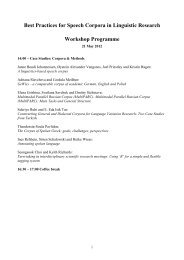96 • 2011 - Hamburger Zentrum für Sprachkorpora - Universität ...
96 • 2011 - Hamburger Zentrum für Sprachkorpora - Universität ...
96 • 2011 - Hamburger Zentrum für Sprachkorpora - Universität ...
You also want an ePaper? Increase the reach of your titles
YUMPU automatically turns print PDFs into web optimized ePapers that Google loves.
ealized syntactically. For example, in a comparative<br />
study of English, Spanish, Japanese, and German motion<br />
verbs in The Hound of the Baskervilles (and its<br />
translations), Ellsworth et al. (2006) find that there are a<br />
number of differences in how the various concepts of<br />
motion are associated with different types of semantic<br />
frames. More specifically, they show that English return<br />
(cf. The wagonette was paid off and ordered to return to<br />
Coombe Tracey forthwith, while we started to walk to<br />
Merripit House) and Spanish regresar both evoke the<br />
Return frame, whereas the corresponding German<br />
zurückschicken evokes the Sending frame. These<br />
differences demonstrate that although the concept of<br />
motion is incorporated into indirect causation, the<br />
frames expressing indirect causation may vary from<br />
language to language (see Burchardt et al., 2009 for a<br />
discussion of more fine-grained distinctions between<br />
verbs evoking the same frame in English and German).<br />
4.3 Polysemy and translation equivalents<br />
Finding proper translation equivalents is typically a<br />
difficult task because one has to consider issues<br />
surrounding polysemy (Fillmore & Atkins, 2000; Boas,<br />
2002), zero translations (Salkie, 2002; Boas 2005a;<br />
Schmidt, 2009), and contextual and stylistic factors<br />
(Altenberg & Granger, 2002; Hasegawa et al., 2010),<br />
among others. To illustrate, consider Bertoldi's (2010)<br />
discussion of contrastive legal terminology in English<br />
and Brazilian Portuguese. Based on the English<br />
Criminal Process frame (see FrameNet), Bertoldi<br />
finds that while there are some straightforward<br />
translation equivalents of English LUs in Portuguese,<br />
others involve a detailed analysis of the relevant<br />
polysemy patterns.<br />
Consider Figure 3, which compares English and<br />
Portuguese LUs in the Notification_of_<br />
charges frame. The first problem discussed by<br />
Bertoldi (2010) addresses the fact that although there are<br />
corresponding Portuguese LUs such as denunciar, they<br />
do not evoke the same semantic frame as the English<br />
LUs, but rather a frame that could best be characterized<br />
as evoking the Accusation frame. The second<br />
problem is that six Portuguese translation equivalents of<br />
the English LUs evoking only the Notification_<br />
of_charges frame, i.e. acusar, acusação, denunciar,<br />
Multilingual Resources and Multilingual Applications - Invited Talks<br />
denuncia, pronunciar, and pronuncia, potentially evoke<br />
three different frames.<br />
Figure 3: English LUs from the Notification_of_<br />
Charges frame and their Portuguese translation<br />
equivalents (Bertoldi, 2010: 6)<br />
Figure 4: LUs evoking multiple frames in the Portuguese<br />
Crime_scenario frame (Bertoldi, 2010:7)<br />
This leads Bertoldi to claim that the LUs acusar,<br />
acusação, denunciar, and denuncia may evoke two<br />
different Criminal_Process sub-frames, besides<br />
15



